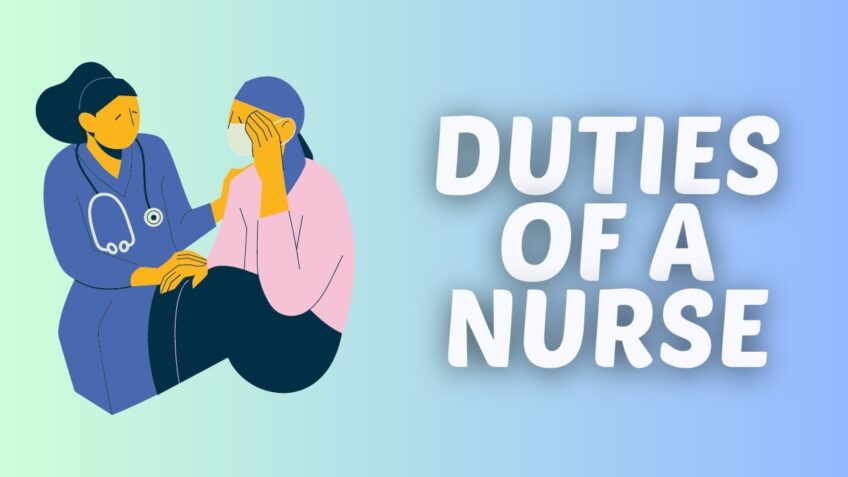Have you ever considered pursuing a career in nursing? If so, then get ready to embark on a challenging yet rewarding journey. The healthcare industry is constantly growing and evolving, making it an exciting time for aspiring nurses to make their mark.
But before diving in headfirst, it’s important to understand what the job entails and what responsibilities come with being a nurse.
Page Contents
Nursing Careers
A career in nursing can be both rewarding and challenging. As a nurse, you will be responsible for providing care to patients in a variety of settings. You may work in a hospital, doctor’s office, or nursing home. Your duties will vary depending on the environment in which you work. However, there are some typical duties that all nurses perform.
As a nurse, you will be responsible for assessing patients’ needs and providing care accordingly. You will also be responsible for documenting patient care and keeping accurate medical records. In addition, you will educate patients and their families about health conditions and treatments. Additionally, you may provide guidance to other members of the healthcare team.
Qualifications and Skills Necessary to Become a Nurse
There are many different types of nurses, but all share some core qualifications and skills. To become a nurse, you need at least an Associate’s Degree in Nursing (ADN) or a Bachelor of Science in Nursing (BSN).
Many employers now require a BSN, so it is recommended that you pursue this degree if you can. You must also pass the National Council Licensure Examination (NCLEX-RN) to become licensed as a registered nurse. Many institutions like this one offer these graduate programs.
After nursing graduate programs, there are certain personal qualities and skills that will make you successful as a nurse. These include:
– Compassion: As a nurse, you will be caring for people who are sick, injured, or scared. You must have compassion for your patients and their families.
– Communication: You must be able to communicate effectively with your patients, their families, and your colleagues. This includes being able to listen attentively and explain things clearly.
– Stamina: Nursing can be physically demanding, so it is essential that you have the physical stamina to handle long hours on your feet.
4 Different Types of Nursing Career Options

A career as a nurse can be both rewarding and challenging. There are many different types of nursing careers available, so it’s essential to consider your options before deciding which one is right for you. Here are just a few of the different types of nursing careers you may want to consider:
- Pediatric Nursing: If you enjoy working with children, pediatric nursing may be the perfect career for you. Pediatric nurses provide care for children of all ages, from newborns to teenagers. They work in hospitals, clinics, and doctor’s offices and often collaborate with other healthcare professionals to provide the best possible care for their patients.
- Neonatal Nursing: Neonatal nurses care for newborn babies who are either premature or have medical conditions that require special care. Neonatal nurses work in hospitals and often collaborate with pediatricians and other healthcare professionals to provide the best possible care for their patients.
- Geriatric Nursing: Geriatric nurses provide care for older adults. They work in hospitals, nursing homes, and other long-term care facilities. Geriatric nurses often collaborate with other healthcare professionals to provide the best possible care for their patients.
- Hospice and Palliative Care Nursing: Hospice and palliative care nurses provide comfort and support to patients who are terminally ill or dealing with a life-threatening illness. Hospice nurses work in hospices or hospitals, while palliative care nurses may work in any
In your journey as a nurse, mastering essential patient care techniques is crucial, which is further elaborated in our discussion on the significance of practical nursing abilities and why they matter for patient outcomes.
Duties and Responsibilities of a Nurse

When it comes to the health and well-being of patients, no one does more than a nurse. To ensure that patients receive the best possible care, nurses collaborate closely with physicians and other medical experts. Depending on their area of expertise, nurses may be responsible for a wide variety of tasks.
Direct care for patients is a nurse’s top priority. Nursing care assessment, planning, delivery, and assessment all fall under one umbrella. Nurses also teach patients and their loved ones how to take better care of themselves in between doctor visits. Nurses also play an important role in ensuring patients and their loved ones get the best care possible.
Nurses are vital to the health care system because of the excellent treatment they give their patients. For the benefit of their patients, they coordinate their efforts with those of other medical experts. Nurses are dedicated to treating their patients with respect and expertise.
Job Outlook for Nurses

The job outlook for nurses is excellent. The Bureau of Labor Statistics projects that the employment of registered nurses will grow by 15 percent from 2016 to 2026, which is much faster than the average for all occupations. The aging baby-boom population and the resulting increase in the number of people with chronic conditions are the main drivers of this demand.
As the population continues to age, the demand for healthcare services will continue to rise. This means there will be a greater need for nurses in all settings, from hospitals and clinics to homes and long-term care facilities. In addition, as more people with chronic conditions live longer, they will require more skilled nursing care.
Conclusion
Becoming a nurse is an incredibly rewarding career, offering professionals the opportunity to care for and help others. With the wide range of job duties and responsibilities that come with this role, it is clear to see why nurses are in such high demand.
From providing vital patient care to taking on administrative roles, there are many different aspects of nursing that offer satisfaction at work and personal growth for those interested in pursuing this profession.
We hope you now have a better idea of what you can expect from a nursing career so you can make the most informed decision possible when deciding whether or not it’s right for you!
Astrona Knight is the Editor-in-Chief at Fischer Institute, where she shares her extensive knowledge on health and wellness topics. Her insightful articles cover everything from diet and nutrition to mental health, providing readers with practical tips and the latest research findings.
Also Read:
- What Are the Duties and Responsibilities of a…
- How To Be The Best Nurse You Can Be: Rise Above the Rest
- Obtaining a Master of Science in Nursing Through an…
- Can You Get a Pedicure if You Have Toenail Fungus?…
- Side Effects of Testosterone Boosters - What They…
- Can You Freeze Liver - Long-Term Storage and Convenience















